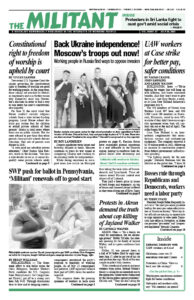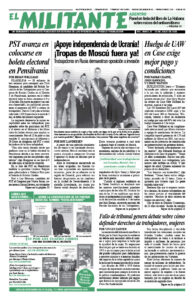People living in the largely devastated outskirts of the Russian-occupied city of Mariupol erupted in a substantial protest July 8 after two pensioners died in the street trying to find drinking water. A meeting at a school in the Volonterivka district demanded that Moscow’s “authorities” urgently provide them with clean water, electricity and transport. The two elderly people had succumbed to heat wave conditions after having to walk for miles.
“About 3,000 people and at least 200 children remain cut off from the minimum basic conditions of existence” in Volonterivka, Petro Andryushchenko, adviser to the Ukrainian mayor of Mariupol, reported that day. Occupation officials first tried to appease the protesters by offering them some food. When those at the meeting reacted with anger, the occupiers fled under the protection of Russian troops carrying assault rifles.
In Moscow’s four-month siege of Mariupol, Russian forces repeatedly bombed residential areas and civilian infrastructure, damaging miles of water pipes. Similar devastation has been inflicted in Severodonetsk and elsewhere in Ukraine, as Moscow’s army relies on mass bombing of civilian areas in preparation for laying siege to them. A large-scale humanitarian catastrophe is building in these Russian-occupied areas.
The day after the Volonterivka protests, occupation authorities tried to patch artillery-damaged rusty pipes with makeshift clamps. Water flows “ended up in muddy pools on the street, rather than in people’s taps,” Halya Coynash wrote July 11 for the Kharkiv Human Rights Protection Group. There is no plan to rebuild the pipelines.
The residents of Mariupol are allocated about 10 pints of drinking water per week. Residents have to get to collection points, then stand in huge lines waiting for a tanker truck. People are forced to collect unsanitary water from drainage pits or puddles.
Over 25,000 residents were killed during the Russian bombardment of Mariupol. Many are buried beneath rubble or in shallow graves. Along with uncollected rubbish, this threatens contamination of the ground water. Due to problems with the water supply, including power failures for water pumps, the city is at risk of an infectious disease epidemic. At the same time, Russian forces have “taken away, often imprisoning, the remaining medical personnel” in the area, Coynash said.
The problems are further exacerbated by the actions of the Russian occupiers toward the largely Russian-speaking residents they claim to have “liberated.” All of the military service-age men from the area are being held in so-called filtration camps and interrogated, sometimes beaten, about connections to Ukraine and its armed forces.
And the priority of Moscow’s occupation authorities is “changing road signs into Russian and ensuring huge screens to enable propaganda channels to be loudly broadcast amid the ruins,” Coynash said.

